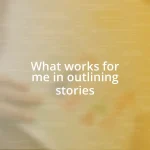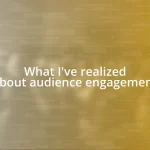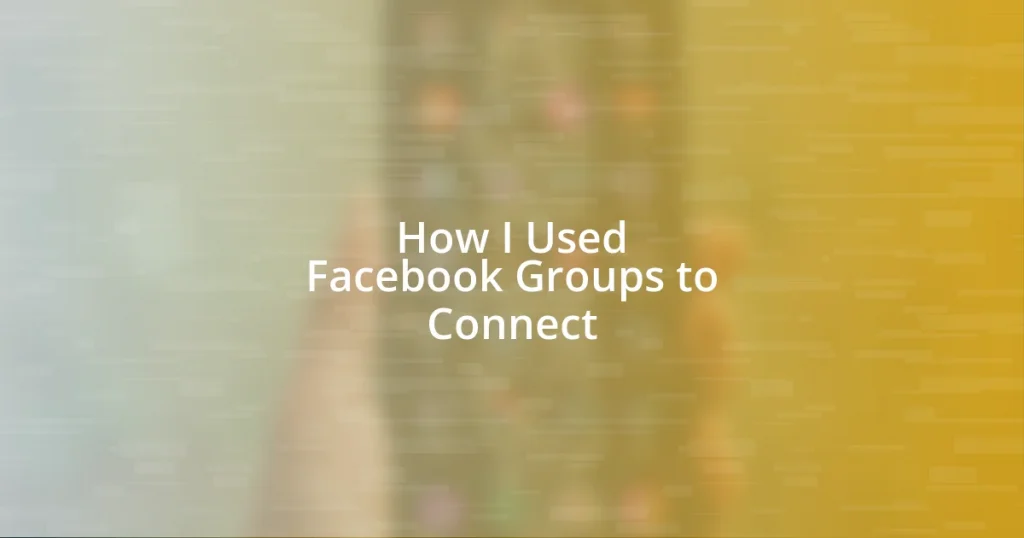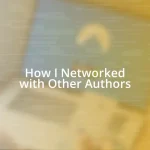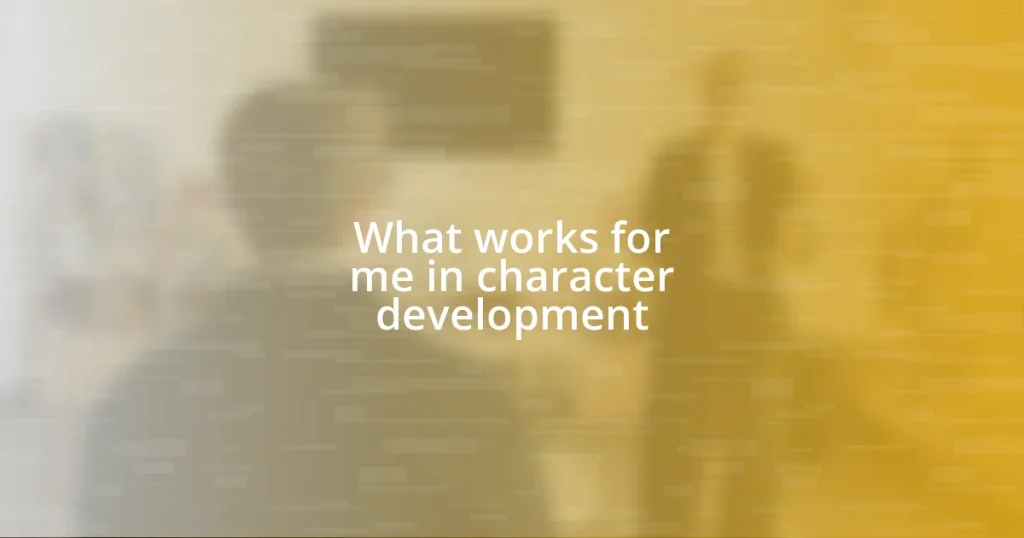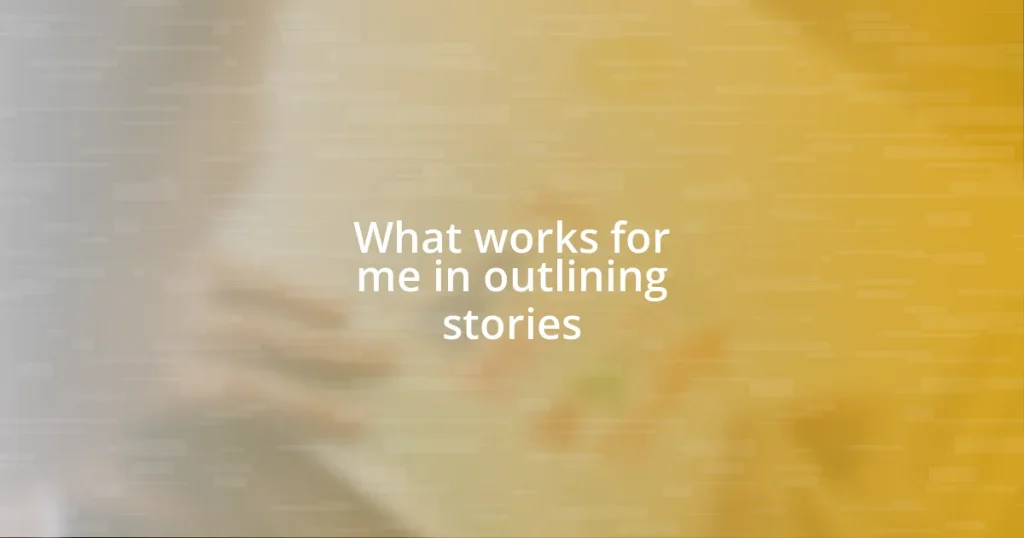Key takeaways:
- Facebook Groups foster a sense of community and collaboration, leading to personal and professional growth through shared knowledge and niche interests.
- Engaging actively within groups—through asking questions, sharing resources, and recognizing others—enhances connections and transforms group experiences.
- Creating and managing your own group allows for building a supportive community, while leveraging insights from member interactions can guide future activities and discussions for meaningful growth.

Understanding Facebook Groups Benefits
One of the most significant benefits of Facebook Groups is the sense of community they foster. I remember joining a small group for freelance writers, and it felt like stepping into a cozy café where everyone shared their stories and offered tips. Have you ever been in a place where you just knew you belonged? That’s the magic of these groups—they create connections that often feel more genuine than interactions on wider platforms.
Another advantage is the wealth of knowledge shared among members. I once found myself stuck on a project, and a simple post in my group led to a flurry of responses with valuable resources and insights I hadn’t considered. Isn’t it reassuring when others are willing to lend a hand? It’s this collaborative spirit that makes Facebook Groups an invaluable tool for both personal and professional growth.
Moreover, the ability to focus on niche interests makes these groups truly special. When I joined a local gardening group, I not only learned about plants but also formed friendships with fellow enthusiasts. Have you thought about how connecting over shared passions can deepen relationships? It’s those meaningful interactions that can often lead to unexpected opportunities and friendships beyond the digital space.

Finding Relevant Facebook Groups
Finding the right Facebook Groups can feel a bit like treasure hunting. I always start by identifying my specific interests or needs. For example, when I was looking for support in my early steps as a photographer, using keywords like “beginner photography” or “photo critique” helped me uncover groups packed with passionate members. Have you tried honing in on your interests in such a targeted way? It can make a world of difference.
Another strategy I’ve found effective is exploring groups suggested by Facebook based on my activity. I remember clicking on a video about digital marketing and suddenly a wealth of group invitations popped up. It’s fascinating how the algorithm can introduce you to communities you might have never discovered otherwise. Have you ever been surprised by a group’s relevancy to your own interests? I’ve learned that sometimes, the best connections are the ones you didn’t even know you were looking for.
Engaging with group posts can also lead to discovering relevant communities. I often participate in discussions, and through interactions, I’ve stumbled upon groups where members truly resonate with my experiences. Sharing my thoughts often opens doors to new groups, just as I found a fantastic community of holistic health advocates after contributing to a wellness thread. Isn’t it exciting to see how one connection can lead to another? There’s always something new waiting to be explored.
| Method | Details |
|---|---|
| Keywords Search | Use specific phrases related to your interests to find niche groups. |
| Algorithm Suggestions | Explore groups suggested by Facebook based on your activity and engagement. |
| Engagement | Participate in discussions to discover new groups through member interactions. |

Joining and Engaging with Groups
Engaging with Facebook Groups is all about diving into the conversation and forming connections that matter. I recall the first time I made a comment on a post in a tech group. The warmth of the responses surprised me. It felt as if I had struck up a conversation with an old friend, despite being virtual strangers just moments before. When you contribute your thoughts, you never know who might resonate with your experiences or questions.
Here are some actionable ways to engage more effectively:
- Ask Questions: Nothing ignites discussion like a thoughtful question. I once asked for feedback on a project I was working on, and it sparked a lively exchange that introduced me to some amazing resources.
- Share Resources: If you discover useful articles or tools, sharing them can add significant value. I remember posting a link to a great online class, and it led to others sharing their own favorite learning materials, creating a mini-library of resources.
- Be Consistent: Regular participation helps you become a familiar face in the group. Monthly insights I shared on photography not only kept me accountable but also encouraged others to open up more over time.
- Celebrate Others’ Achievements: Acknowledging other members’ milestones fosters a positive atmosphere. When I congratulated someone on landing their dream job, it sparked a thread of supportive messages that uplifted everyone.
- Start Polls or Topics: If you’re looking to gauge opinions or interests, starting a discussion thread can be a fun way to get everyone involved and think critically about shared passions.
Being active doesn’t just enhance your experience; it genuinely transforms how you perceive community. Each interaction builds a tapestry of connection that can lead to lasting friendships and professional collaborations.

Creating Your Own Facebook Group
Creating your own Facebook group can be an empowering experience, one I didn’t fully appreciate until I took the plunge. I still remember the moment I decided to launch a group focused on digital storytelling. The very first day, I felt a blend of excitement and apprehension. Would anyone join? When I saw the initial members trickle in, my heart swelled with hope, knowing that I was creating a space for like-minded individuals to gather. Have you ever thought about the impact you could make by hosting your own community?
The key to building a successful group lies in clarity of purpose. For instance, when I started my group, I crafted a detailed description that explained why it existed and what members could gain from it. I included guidelines to foster respect and collaboration, which set a welcoming tone. As soon as I hit “publish,” I felt a surge of anticipation; I was eager to see how these shared values would attract the right people. What are your passions that could bring others together in a shared mission?
As the group began to grow, I found myself actively engaging with the members. I made it a point to welcome newcomers personally, sharing my own story and encouraging them to share theirs. This connection fostered trust and openness, transforming strangers into a vibrant community. I vividly recall a member posting a heartfelt story about overcoming creative blocks, and it sparked an incredible conversation—everyone chimed in, offering support and insight. It was a beautiful reminder of how powerful collective vulnerability can be. Isn’t it fascinating how a simple Facebook group can become a rich tapestry of shared experiences?

Attracting Members to Your Group
Attracting members to your Facebook group is crucial for creating a vibrant community. One method I found effective is leveraging existing connections. When I launched my group, I reached out to friends and acquaintances who I thought would appreciate the theme. Their initial involvement not only created momentum but also drew in others. It’s like setting a small flame; once others see it, they want to warm themselves by it too. Have you ever noticed how enthusiasm can be contagious?
Another approach that worked well for me was collaborating with other groups. By promoting my group in related spaces, I caught the attention of individuals already interested in similar topics. I remember posting in a writing group about my new digital storytelling space and inviting members to join. The response was overwhelming! It highlighted how engaging with others could broaden my audience. What if you reached out to others about your interests?
Lastly, I paid attention to the visuals and branding of my group. When I first created the cover photo, I wanted it to resonate with potential members. It was in vivid colors, featuring imagery that echoed the spirit of storytelling. The first impression mattered, and I truly believe it contributed to attracting like-minded souls. Have you ever judged a book by its cover? It’s amazing how a little creativity can pique interest and encourage people to click that “join” button.

Building Connections through Group Activities
Participating in group activities is a key ingredient for forging deeper connections among members. I recall one particular virtual workshop we organized centered on storytelling techniques. As each participant shared their challenges and triumphs, the atmosphere buzzed with shared passion. The camaraderie that developed felt almost electric, don’t you think? It’s extraordinary how collaborating on a creative project can give rise to friendships that extend beyond the screen.
Another unforgettable moment occurred during a themed challenge we launched. I suggested members post a story based on a seasonal theme, and I was amazed at the creativity that flowed. People jumped in with their unique interpretations, and the resulting discussions brought everyone closer together. When I saw a member share how writing helped them cope with anxiety, I realized that these activities had created a supportive network where vulnerability was embraced. Have you ever participated in a group challenge that made you feel connected to others?
The beauty of group activities lies in the shared experiences they create. I remember the sense of belonging I felt when my group hosted a virtual celebration for reaching 100 members. We shared personal highlights and expressed our gratitude, which turned a simple milestone into a cherished memory. Celebrating such moments together fosters a sense of unity and purpose that reinforces ties among members. Isn’t it wonderful how collective achievements can make us all feel like part of something bigger?

Leveraging Group Insights for Growth
Leveraging insights from group interactions can significantly bolster growth in your Facebook community. I often dive into the analytics provided by Facebook to gauge what content resonates best with my members. For example, when I shared a post that sparked robust discussions about storytelling techniques, the engagement metrics revealed an appetite for collaborative learning. It made me think: how often do we pause to understand what truly excites our community?
Furthermore, tapping into direct feedback from group members has proven invaluable. I initiated a simple poll asking members what topics they wanted to explore next. The responses were enlightening! Seeing people’s interests laid out helped shape our future workshops and discussions. It was a reminder that our members hold the key to the group’s direction. Have you ever considered how listening to your audience could transform your approach?
Lastly, observing member interactions offers a wealth of information. I noticed some members consistently engaged with posts that highlighted personal stories versus educational content. This insight led me to incorporate more narrative-driven content, which deepened connections within the group. The dynamic changed, and I could almost feel the energy shift as more members began to share their journeys. Isn’t it fascinating how simply paying attention can guide your group toward more meaningful growth?

